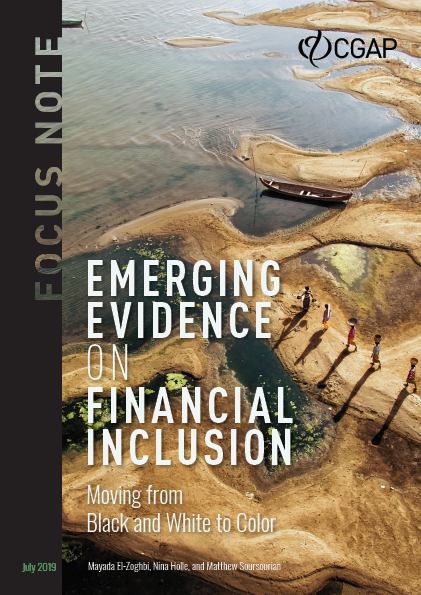 Research on the impact of financial services on the lives of low-income people provides valuable insights. However, these studies tend to focus on microcredit or a single financial product, such as savings or mobile money. As a result, an overly simplistic and product-focused story has emerged. Recognizing the need for a more nuanced and clearer impact narrative, this CGAP Focus Note Emerging Evidence on Financial Inclusion synthesizes evidence since 2014 and highlights three overarching insights:
Research on the impact of financial services on the lives of low-income people provides valuable insights. However, these studies tend to focus on microcredit or a single financial product, such as savings or mobile money. As a result, an overly simplistic and product-focused story has emerged. Recognizing the need for a more nuanced and clearer impact narrative, this CGAP Focus Note Emerging Evidence on Financial Inclusion synthesizes evidence since 2014 and highlights three overarching insights:
- Financial services improve resilience both by facilitating recovery from shocks and encouraging investments that are riskier but potentially more profitable in the longer term.
- Women’s control and ownership of financial services can improve their bargaining power in the household and enable positive outcomes, such as increasing their participation in the labor force.
- Emerging evidence suggests that financial inclusion can contribute to increased economic growth and reduced poverty.
Other findings demonstrate that expanding access to basic accounts alone is unlikely to result in detectable welfare benefits, while digitizing financial services shows promising effects on poverty but also introduces potential risks (e.g., weakening of social networks). Going forward, more information is needed on context and customer demographics to better understand who benefits from certain financial services and how and under what circumstances financial inclusion may not be beneficial.
Source: CGAP
Other findings demonstrate that expanding access to basic accounts alone is unlikely to result in detectable welfare benefits, while digitizing financial services shows promising effects on poverty but also introduces potential risks (e.g., weakening of social networks). Going forward, more information is needed on context and customer demographics to better understand who benefits from certain financial services and how and under what circumstances financial inclusion may not be beneficial.
Source: CGAP
Tags Article: